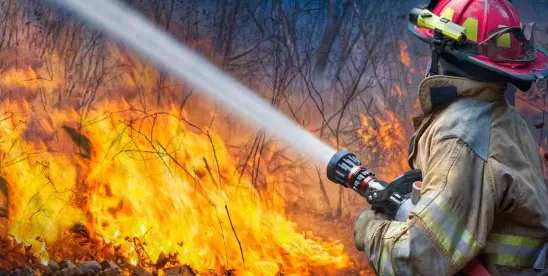As the Southern California wildfires rage on with devastating consequences, employers may be grappling to formulate an appropriate response.
Employers may have specific legal obligations as well as optional ways to provide assistance to affected employees. This publication addresses applicable employment laws that implicate pay, leaves, and other aspects of employment that may be impacted by the wildfires. Employers should also review our publication on special benefits they may wish to provide.
Employer Obligations
Notice Requirement for New Hires
California law requires employers to provide non-exempt employees with a wage theft notice upon hire. Among other requirements, employers must notify employees if there is a state or federal emergency or disaster declaration applicable to the county or counties where the employee will work issued within 30 days before the employee’s first day of employment that may affect their health and safety. Accordingly, employers in Los Angeles and Ventura counties will need to notify non-exempt employees starting employment within thirty days after January 7, 2025 that the Governor issued an Emergency Proclamation related to the wildfires if the emergency may affect their health and safety during their employment.
Disaster and Evacuation Zones
Except for certain essential personnel, employees are generally protected from retaliation by employers under a new California law if they refuse to work in unsafe conditions, including refusing to work in evacuation zones. The law also prohibits employers from preventing any employee from accessing their mobile or other communication device for seeking emergency assistance, assessing the safety of the situation, or communicating with a person to confirm their safety. California employers can monitor to see whether their worksites are subject to an evacuation order or evacuation warning through resources such as the California Department of Forestry and Fire Protection (CalFire)’s Emergency Incident website.
Addressing Wildfire-Related Workplace Closures
Employers in certain industries or specific circumstances may be subject to special rules governing their payroll and benefits obligations, as detailed in this section below. If in doubt about whether any of the following special rules or exceptions apply, and for information about additional wage and hour laws, California employers should seek counsel to ensure compliance. Several points are broadly applicable to employers whose normal operations are disrupted by the ongoing disaster.
Non-Exempt (Overtime-Eligible) Employees
Under normal circumstances, California requires employers to provide reporting time pay to non-exempt employees who report to work but are sent home early by the employer. Specifically, when a non-exempt employee reports for their shift and works less than half of their scheduled shift, they must be compensated for “reporting time” at their regular rate of pay for at least half of their scheduled hours, but in no event for less than two hours nor more than four hours.
However, no reporting time pay is due:
- When the employer's operations cannot begin or continue due to threats to employees or property, or when civil authorities recommend that work not begin or continue;
- When public utilities fail to supply electricity, water, or gas, or there is a failure in the public utilities, or sewer system; or
- When the interruption of work is caused by conditions not within the employer's control (for example, a wildfire).
When a business must close due to a wildfire (as a result of a threat to employees or property, a public utilities failure, or on civil authorities’ recommendation), the reporting time pay requirements do not apply. In this limited scenario, an employer that sends non-exempt employees home early must only pay for the hours the employee actually worked. However, as noted below, employees may be entitled to access paid time off, such as vacation and paid sick time under an employer’s policies and applicable law to be compensated during the time not worked.
Similarly, retail employers operating in the City of Los Angeles that are subject to the Fair Work Week Ordinance should note that store closures due to the wildfires may qualify as a “force majeure” exemption from the ordinance’s predictive scheduling requirements, as described in Regulation 5.1 of the Rules and Regulations implementing the law.
Exempt (Overtime-Ineligible) Employees
Generally, under federal and California law, when an exempt employee performs any work during a workweek, they are entitled to their full pay for the workweek. Therefore, even if an exempt employee only works one day in a workweek before a business is closed due to a wildfire, the employer must generally pay the exempt employee for the entire workweek.
However, if a business is closed for a full workweek and the exempt employee performs no work, an employer is not required to pay the employee for that workweek (though an employer may still choose to do so). Employees who are not paid for a full week for this reason may be entitled to access paid time off, such as vacation and paid sick time under an employer’s policies and applicable law.
Wildfires’ Impact on Unemployment Benefits and Filing of Payroll Taxes/Reports
Employees who lose their jobs or have their hours reduced due to the wildfires may be eligible for unemployment insurance benefits through the State of California. The Governor’s Executive Order N-2-25 related to the wildfires waives the one-week waiting period for affected workers who qualify for regular unemployment benefits. The order also allows employers to request up to a 60-day extension to file state payroll reports or deposit payroll taxes.
In addition, individuals who lost their jobs due to the severe wildfires and winds, and who do not qualify for regular unemployment benefits, may now apply for federal Disaster Unemployment Assistance (DUA). DUA benefit claims must be filed by March 10, 2025.
Leave of Absence and Time Off Considerations
Employers in impacted areas will likely see employees taking time off from work for various wildfire-related reasons. In this regard, employers should keep the following laws in mind, including some recent amendments.
California and Los Angeles City Paid Sick Time
Employees who need time off due to wildfire-related reasons may be entitled to use paid sick time under state and local law. This can be for treatment or for preventative care. Employers should remember that covered “family members” include an employee’s parent, child, spouse, registered domestic partner, grandparent, grandchild, sibling or designated person. A “designated person” is anyone designated by the employee at the time of taking leave. While employees may be limited to one designated person per year under state law, the Los Angeles City paid sick leave law also covers as family members any individual related to the employee by blood or affinity whose close association with the employee is the equivalent of a family relationship.
The number of paid sick time hours to which employees are entitled under California law increased last year to 40 hours per year. Employers should also be mindful that employees working in the City of Los Angeles may be entitled to up to 48 (not 40) hours of paid sick time per year. More time may be required under both laws if the employer uses an accrual-based policy.[1]
The California Family Rights Act (“CFRA”)
Employers should also recall that, to the extent an eligible employee needs to take time off to care for their own serious health condition or a serious health condition of a family member, the California Family Rights Act applies where an employer has at least five employees (not 50, as under the FMLA), and that under CFRA, the definition of “family member” is broader than under the FMLA. Specifically, in addition to covering an employee’s spouse, parents, and minor children, CFRA also covers an employee’s child of any age, domestic partner, parent-in-law, grandparent, grandchild, or sibling with a serious health condition. As is the case with the paid sick leave law, there is also a “designated person” provision. Under this law, a designated person can be any individual related by blood or whose association with the employee is the equivalent of a family relationship.
Employers should also remember that even in cases where the FMLA and/or CFRA does not apply, the employer may be required to allow an employee to take time off as an accommodation for a disability under the federal ADA and/or the California Fair Employment and Housing Act.
Other Potentially Applicable California Leave Laws
California employers should also be mindful of the following leave laws that could be implicated by the fires. The State’s School Activities Leave Law may provide employees with the right to take time off in connection with school closures and other childcare emergencies, and to locate and enroll a child in a new school. Further, California’s recently expanded crime and victim leave laws may require that employees be given time off to testify or attend court proceedings related to certain crimes or obtain medical treatment and psychological counseling in connection with domestic violence. Finally, under California’s bereavement leave law, employers should be aware that they must provide up to five unpaid days off in connection with the death of certain family members of their employees.
Wildfire Smoke and Workplace Safety
The California Division of Occupation Safety and Health (Cal/OSHA)’s “Protection From Wildfire Smoke” regulation addresses the hazards employees may be exposed to from small particles in wildfire smoke, known as PM2.5.
Employers must comply with the regulation where applicable unless:
- The worksite is a completely enclosed building or vehicle in which air is filtered by a mechanical ventilation system and the employer ensures that windows, doors, and other openings are kept closed except when it is necessary to open doors to enter or exit.
- The employee’s exposure is limited to a total of one hour or less during a shift.
- The employee is a firefighter engaged in wildland firefighting.
When an employer subject to the regulation should reasonably anticipate that employees may be exposed to wildfire smoke, the employer must:
- Monitor the Air Quality Index (AQI) for levels of PM2.5, which can be monitored through resources such as the U.S. Environment Protection Agency’s AirNow website.
- Implement a system for communicating wildfire smoke hazards in a language and manner readily understandable by all employees.
- Provide relevant training.
- Control harmful exposures to employees, including but not limited to, providing NIOSH-approved respirators (such as N95s) to employees for voluntary use when AQI for PM2.5 is between 151 to 500; and for mandatory use when AQI for PM 2.5 exceeds 500.
Cal/OSHA maintains an informative “Worker Safety and Health in Wildfire Regions” webpage, including a fact sheet for employers.
Additional Ways to Assist Employees
- Provide your employees with information from the State and County regarding wildfire resources and recovery.
- Provide your employees with a 401(k) or other benefits plan that allows for hardship distributions for disaster-related expenses and losses, or remind them of existing distribution options.
- Work with tax advisers to explore the feasibility of providing employees with non-taxable payments to assist with disaster-related expenses or establishing a charitable foundation to provide disaster relief assistance to employees.
- Consider donating to or collaborating with an existing charitable relief organization to aid employees, clients, and other stakeholders in need.
- Add an Employee Assistance Program (EAP) as a benefit, which includes counseling and other social services to assist employees and families in crisis. If the company already maintains an EAP, remind employees of its existence and benefits provided.
ENDNOTES
[1] Recent changes to the California paid sick time law include an expansion of the use of paid sick time for “safe time” purposes and clarification of the preventative care reasons for which agricultural employees may use paid sick time. We wrote about that here.





 />i
/>i

